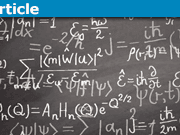The Fundamental Difference in Interpretations of Quantum Mechanics
A topic that continually comes up in discussions of quantum mechanics is the existence of many different interpretations. Not only are there different interpretations, but people often get quite emphatic about the one they favor so that discussions of quantum mechanics can easily turn into long arguments. Sometimes this even reaches the point where proponents of a particular interpretation claim that anyone who doesn’t believe it is “idiotic”, or some other extreme term. This seems a bit odd given that all of the interpretations use the same theoretical machinery of quantum mechanics to make predictions, and therefore whatever differences there are between them are not experimentally testable.
In this article, I want to present what I see as a fundamental difference in interpretation that I think is at the heart of many of these disagreements and arguments.
I take no position on whether either of the interpretations I will describe is “right” or “wrong”; my purpose here is not to argue for either one but to try to explain the fundamental beliefs underlying each one to people who hold the other. If people are going to disagree about interpretations of quantum mechanics, which is likely to continue until someone figures out a way of extending quantum mechanics so that the differences in interpretations become experimentally testable, it would be nice if they could at least understand what they are disagreeing about instead of calling each other idiots. This article is an attempt to make some small contribution towards that goal.
The fundamental difference that I see is how to interpret the mathematical object that describes a quantum system. This object has various names: quantum state, state vector, wave function, etc. I will call it the “state” both for brevity and to avoid adopting any specific mathematical framework since they’re all equivalent anyway. The question is, what does the state represent? The two fundamentally different interpretations give two very different answers to this question:
- (1) The state is only a tool that we use to predict the probabilities of different results for measurements we might choose to make of the system. Changes in the state represent changes in the predicted probabilities; for example, when we make a measurement and obtain a particular result, we update the state to reflect that observed result, so that our predictions of probabilities of future measurements change.
- (2) The state describes the physically real state of the individual quantum system; the state allows us to predict the probabilities of different results for measurements because it describes something physically real, and measurements do physically real things to it. Changes in the state represent physically real changes in the system; for example, when we make a measurement, the state of the measured system becomes entangled with the state of the measuring device, which is a physically real change in both of them.
(Some people might want to add a third answer: the state describes an ensemble of a large number of similar systems, rather than a single system. For purposes of this discussion, I am considering this to be equivalent to answer #1, because the state does not describe the physically real state of a single system, and the role of the ensemble is simply to enable a frequentist interpretation of the predicted probabilities.)
(Note: Originally, answer #1 above talked about the state as describing our knowledge of the system. However, the word “knowledge” is itself open to various interpretations, and I did not intend to limit answer #1 to just “knowledge interpretations” of quantum mechanics; I intended it to cover all interpretations that do not view the state as directly describing the physically real state of the system.)
The reason there is a fundamental problem with the interpretation of quantum mechanics is that each of the above answers, while it contains parts that seem true, leads us, if we take it to its logical conclusion, to a place that doesn’t make sense. No choice gives us just a set of comfortable, reasonable statements that we can easily accept as true. Picking an interpretation requires you to decide which of the true things seems more compelling which ones you are willing to give up, and/or which of the places that don’t make sense is less unpalatable to you.
- For #1, the true part is that we can never directly observe the state, and we can never make deterministic predictions about the results of quantum experiments. That makes it seem obvious that the state can’t be the physically real state of the system; if it were, we ought to be able to pin it down and not have to settle for merely probabilistic descriptions. But if we take that idea to its logical conclusion, it implies that quantum mechanics must be an incomplete theory; there ought to be some more complete description of the system that fills in the gaps and allows us to do better than merely probabilistic predictions. And yet nobody has ever found such a more complete description, and all indications from experiments (at least so far) are that no such description exists; the probabilistic predictions that quantum mechanics gives us are the best we can do.
- For #2, the true part is that interpreting the state as physically real makes quantum mechanics work just like all the other physical theories we’ve discovered, instead of being a unique special case. The theoretical model assigns the system a state that reflects, as best we can in the model, the real physical state of the real system. But if we take this to its logical conclusion, it implies that the real world is nothing like the world that we perceive. We perceive a single classical world, but the state that QM assigns is a quantum superposition of many worlds. We perceive a single definite result for measurements, but the state that QM assigns is a quantum superposition of all possible results, entangled with all possible states of the measuring device, and of our brains, perceiving all the different possible results.
Again, my purpose here is not to pick either one of these and try to argue for it. It is simply to observe that, as I said above, no matter which one you pick, #1 or #2, there are obvious drawbacks to the choice, which might reasonably lead other people to pick the other one instead. Neither choice is “right” or “wrong”; both are just best guesses, based on, as I said above, which particular tradeoff one chooses to make between the true parts and the unpalatable parts. We have no way of resolving any of this by experiment, so we simply have to accept that both viewpoints can reasonably coexist at the present state of our knowledge.
I realize that pointing all this out is not going to stop all arguments about interpretations of quantum mechanics. I would simply suggest that, if you find yourself in such an argument, you take a moment to step back and reflect on the above and realize that the argument has no “right” or “wrong” outcome and that the best we can do at this point is to accept that reasonable people can disagree on quantum mechanics interpretations and leave it at that.
- Completed Educational Background: MIT Master’s
- Favorite Area of Science: Relativity








Ok – we are now simply discussing viewpoints of various approaches to physics. I think the discussion about the paper has pretty well run its course. So in order to maintain a well ordered thread so others can read it and learn a bit more about the paper it will be closed. Thanks to all those that participated – it has been interesting.
Thanks
Bill
Hm, you may as well ask, why real euclidean 3D affine space is a useful tool in classical mechanics. The answer is always the same: Physics is an empirical science, and any mathematical tool that describes the empirical findings right, is wellcome to be used to formulate theories. The short answer: Mathematical structure/tool XY is useful, because it works!
The fact in Copenaghen interp. we can't in general predict a measurement's outcome doesn't seem much surprising to me: even in an interaction between a magnetic field and single electrons (Stern-Gerlach/like experiment) we have a field (magnetic field) interacting with another field (electron field) and fields are not objects always exactly determined in space and time (Fourier).
Can someone help me to understand if my intuition can have some foundation?I would say that what's surprising about QM is not actually the nondeterminism, but the certainty. Or the way that nondeterminism and certainty are combined.
In an EPR experiment, you produce an electron/positron pair. When you measure the spin of the electron along the z-axis, you randomly get spin-up or spin-down. It seems that there is no way to get a more accurate prediction. But actually, there is: If somebody has already measured the spin of the positron along the z-axis, you know with certainty that the electron will have the opposite result.
fields are not objects always exactly determined in space and timeThey are exactly determined by Maxwell's equations so that's not the issue.
It deeper than that – much deeper. Even if its an issue is up grabs – I personally don't think it is, but many do not agree.
Learn a few interpretations, choose one if you like, and you will understand the QM formalism a lot better.
But for heavens sake don't argue the one you choose, say – yes it's the one I use and give a bit of a blurb why you chose it – that's fine – but don't get into long discussions justifying it – they go nowhere, are useless, nobody really learns anything, and will attract the attention of poor overworked mentors like me to clean it up and may even issue an infraction.
Thanks
Bill
There are a lot of development on the ontic view to justify the consistency. A loosely closest intuition of direct approximation on observed values. We detect superposition and provide numerous experiments that closely related to that notion.
In Special relativity/GR. They are always critical on observed values. For instance, if they observed oddity on optics like 4 identical star spread out at a certain distance. Our local intuition will easily fall for "It must be 4 separate stars" until Gravitational Lensing formalism hits them in head and was 1 star projected into 4 all along; computing convergence and deflection even if it appears as if they are in superposition of some sort (at least visually).
The fact in Copenaghen interp. we can't in general predict a measurement's outcome doesn't seem much surprising to me: even in an interaction between a magnetic field and single electrons (Stern-Gerlach/like experiment) we have a field (magnetic field) interacting with another field (electron field) and fields are not objects always exactly determined in space and time (Fourier).
Can someone help me to understand if my intuition can have some foundation?
Thanks
—
lightarrow
The mathematics of modeling ourselves as a superposition of persons who observe different macroscopic results may work out, but it doesn't explain our sensation of being only one of those persons.Of course it doesn't. That's part of the assumption each element of the mixed state is a separate world – isn't defining your way out of troubles groat?
Thanks
Bill
Exactly. Thank you for your efforts. But, I think that I'll remain unconvinced about the virtues of the MWI. I just don't see how it provides any deeper understanding. Perhaps my brain is entangled the wrong way. So, I'll stick to my old-fashioned idea that a random sequence of measured outcomes is just that — "a random sequence of measured outcomes".Thats OK – there is no right or wrong in this interpretation stuff. A pity though you don't see the things it says about the formalism:
1. You do not need collapse
2. You can have an entirely deterministic theory where the wave-function is real
3. A more subtle understanding of probability in QM
There are undoubtedly others as well.
It however, while mathematically very beautiful when you go into it, is simply far too weird for most – far too weird for me for example. But weirdness and truth are two different things – its entirely up to you if you believe it – I don't – but that means absolutely nothing – except what I personally find it too weird.
Thanks
Bill
Another way of stating this question is, how does MWI give us the Born rule?Gleason – but it is controversial.
All interpretations have strengths and weaknesses – this is the weakness of MW. MW adherents claim it is solved – those not so enamoured by it criticize it on those grounds.
What I can say is the following book is a very mathematical examination of MW by a guy with both a PhD in physics and philosophy (Wallace):
https://www.amazon.com/Emergent-Multiverse-Quantum-according-Interpretation/dp/0198707541
Here he proves the non-contextuality theorem in MW which put it on very firm ground.
I have been though the book and cant find any error – someone else may also enjoy trying.
Thanks
Buill
But still, even within MWI, there should be a point where a choice must be made, which copy of myself –No – its via decoherence, which happens very very quickly, but not instantaneously. No choice is made – as I said after decoherence the 'state ' (I will not use wave-function here otherwise confusion may result – I will use the exact terminology – state) is now a mixed state. Each outcome is interpreted as its own world and it turns out the pi in the mixed state detailed in my post above are the odds you will find yourself in a particular world if you were there. Of course in this Bayesian type interpretation of probability as the rational belief you have in those as odds, degree of confidence. plausibility, or whatever you want to call it, does not require you to be there – if it did it would make nonsense out of probability theory which is of course not nonsense – you were undoubtedly taught its basics at school – and for good reason – its a very very useful mathematical tool.
What you probably were not taught about is the so called cox axioms"
https://en.wikipedia.org/wiki/Cox's_theorem
That's the version of probability used here.
Thanks
Bill
I'll stick to my old-fashioned idea that a random sequence of measured outcomes is just that — "a random sequence of measured outcomes".One potential issue with the MWI is how, exactly, it predicts that we should all observe a random sequence of measured outcomes if we run a large number of trials of quantum experiments. Or more precisely, how it predicts that each individual branch of the wave function will describe an observer who observes a random sequence of measured outcomes.
If we take the MWI at face value, then, for example, if someone runs 100 trials of a Stern-Gerlach measurement on electrons from a source whose wave function is set up to give a 50-50 chance of each outcome, then there is a branch of the wave function in which the person observes a "spin up" result 100 times in a row. And similarly for spin down. In fact, there will be ##2^{100}## branches, each corresponding to one of the ##2^{100}## possible sequences of measurement results. But we don't ever seem to meet any observers who have observed such things–or, again putting things into MWI language, there don't seem to be any branches of the wave function that we have evidence for, that contain any such observers. (Another way of stating this question is, how does MWI give us the Born rule?)
Isn't it true that in M(any)W(orlds)I(nterpretation) each measurement creates new Universes — as many as there are possible measurement outcomes? But you — the observer — must jump into one of these Universes to get on with your life. And this jump is random. So, we are back to the fundamental irreducible randomness, this time with all the bells and whistles of multiple worlds.No.
MW is deterministic – you just have an evolving wave-function – that's it – that's all. But decoherence occurs so that you have an improper mixed state ∑pi |xi><xi>. Here |xi><xi| are the possible outcomes. The interpretation is each of those outcomes is a separate world – that is the interpretive assumption of MW. And, it turns out pi is, as a rational being, the likelihood you will find yourself in a particular world. This of course requires the Bayesian Interpretation of probability – but I prefer in this case calling it the decision theory version – in this version probability is what a rational being would decide as odds if they had to wager on it – a subtle difference – yes – but in this case an important one. Its not the only place that uses it – actuaries do as well. But anyway it turns out, using Gleason's Theorem, you can show the pi are the odds. There is a direct decision theory augment but a lot of people criticize it – Gleason however is water tight. The only out is contextuality – and there is a theorem in many worlds – the non-non contextuality theorem that ensures it is always the case ie its not contextual.
Thanks
Bill
I think that I'll remain unconvinced about the virtues of the MWI.As are many people. I'm not much of a fan of it myself. But it's still important to be clear about what it actually says, even if you're going to end up not believing it. (Perhaps especially if you're going to end up not believing it.)
If "you" are only aware of one result, how we avoid the conclusion that there are different physical versions of yourself who are aware of the other results?If "different physical versions of yourself" just means "different branches of the wave function of your brain that are entangled with different branches of objects you observe", then that is exactly the conclusion, yes. But it's very tempting to read metaphysical implications into that that aren't there, or at least not necessarily there. For example, there is no "copying" of things, as I said before; the time evolution of the wave function is unitary, and unitary operations can't "copy" anything. There is just one wave function.
The mathematics of modeling ourselves as a superposition of persons who observe different macroscopic results may work out, but it doesn't explain our sensation of being only one of those persons.That's because we can't explain how our conscious experiences arise from the physical happenings in our brains, regardless of which interpretation of QM we adopt. But if we hypothesize that our conscious experiences have something to do with our brain states, then it seems perfectly reasonable that, if there are different branches of the wave function in which our brains are in different states, then we would have different conscious experiences in those different branches.
I understand that this is difficult to wrap your mind around.Exactly. Thank you for your efforts. But, I think that I'll remain unconvinced about the virtues of the MWI. I just don't see how it provides any deeper understanding. Perhaps my brain is entangled the wrong way. So, I'll stick to my old-fashioned idea that a random sequence of measured outcomes is just that — "a random sequence of measured outcomes".
Eugene.
You are only aware of one result because your awareness depends on your brain state, and the different branches of the wave function have different states for your brain, just as they have different states for the measured system.If "you" are only aware of one result, how we avoid the conclusion that there are different physical versions of yourself who are aware of the other results?
The mathematics of modeling ourselves as a superposition of persons who observe different macroscopic results may work out, but it doesn't explain our sensation of being only one of those persons.
when I looked at the Stern-Gerlach device last time I can swear I saw only the "spin up". So, where did the other ("spin down") portion disappeared? In another Universe?The problem is that word "I". You are using it like it refers to the entire "piece" of the wave function that corresponds to your brain. But it doesn't. It only refers to the part of your brain's wave function that got entangled with the spin up part of the electron's wave function. There is another part of your brain's wave function that got entangled with the spin down part of the electron's wave function; and that part of your brain's wave function uses the word "I" to refer to itself, just as the part you are thinking of in the quote above, the part that got entangled with the spin up part of the electron's wave function, uses the word "I" to refer to itself. So the problem is that there is only one word, "I", but it's doing double duty. This is very confusing, of course, but it's what we get for trying to use ordinary language to describe something that ordinary language has no proper terminology to describe.
I would like to have a theory that describes for me what I see (or what I think I see) in my Universe.The MWI does do that; it tells "you" that "you" will observe whatever is consistent with the states of the observed object that "your" brain gets entangled with. But the referent of the word "you" has to be clearly understood. See above.
When you perceive an electron coming out of the "spin up" side of a Stern-Gerlach device, that's because the branch of the electron's wave function that that branch of your brain is entangled with is coming out of the "spin up" side of the device.Sorry for being so slow. But I just don't get it.
I understand that there is a part of my brain's wave function entangled with the "spin up" electron. I can also accept that there is another piece/part/branch of my brain entangled with the "spin down" electron. But when I looked at the Stern-Gerlach device last time I can swear I saw only the "spin up". So, where did the other ("spin down") portion disappeared? In another Universe?
I don't care whether the "spin down" portion disappeared in reality, or only in my perception. For me it did disappear, because I didn't see it. I don't care if both up and down portions exist in the MWI wave function (maybe in different Universes). I would like to have a theory that describes for me what I see (or what I think I see) in my Universe. And I see that the up and down outcomes occur in some random pattern, if I keep repeating my experiment. But the MWI tries to convince me that both outcomes coexist. Then who is right, me — the observer — or the MWI?
Eugene.
there is the MWI, which says that even our perceptions are illusionsNo, they're not illusions. When you perceive an electron coming out of the "spin up" side of a Stern-Gerlach device, that's because the branch of the electron's wave function that that branch of your brain is entangled with is coming out of the "spin up" side of the device. All of the entanglements match up just the way they should for the results you perceive to be correct.
there is nothing but the super-entangled MWI wave functionThe MWI doesn't say there is "nothing but" the wave function. It just says that everything is "made of" the wave function, the same way classical atomic theory said everything was made of atoms. The MWI does not say that you and I don't exist. It just says that what we are actually referring to by the words "you" and "I" is not as simple as our naive intuitions tell us it is.
In other words, according to the MWI, we don't actually know that "in reality", measurements have single results. All we know is that we observe measurements to have single results. The MWI accounts for this the way I explained just above–by treating our observations, our experiences, as part of the universal wave function, so they get entangled, superposed, etc., just like everything else.Thank you for explaining this. If so, then the MWI is the weirdest kind of philosophy. I remember learning that there are two major schools of philosophy:
Materialism says that things happen in the real world, and our perceptions are just reflections of these objective events. I am cool with that.
Idealism says that the real world is just an illusion, and all we have are our perceptions. I can accept even that.
But now, there is the MWI, which says that even our perceptions are illusions, and there is nothing but the super-entangled MWI wave function. How weird is that!
Eugene.
in reality measurements do have single results.Not if the MWI is true. If the MWI is true, all possible results happen, and each result is entangled with the appropriate state of measuring devices, observers, etc., so that, for example, all possible experiences you can have observing the different possible results of a measurement also happen. You are only aware of one result because your awareness depends on your brain state, and the different branches of the wave function have different states for your brain, just as they have different states for the measured system.
In other words, according to the MWI, we don't actually know that "in reality", measurements have single results. All we know is that we observe measurements to have single results. The MWI accounts for this the way I explained just above–by treating our observations, our experiences, as part of the universal wave function, so they get entangled, superposed, etc., just like everything else.
I understand that this is difficult to wrap your mind around. But any discussion of interpretations of QM has to take it into account.
In the MWI, measurements do not have single results; they have all possible results.But in reality measurements do have single results. Then how does MWI relates to reality?
Eugene.
But still, even within MWI, there should be a point where a choice must be made, which copy of myself — the observer — is the real oneNope. In the MWI, the wave function is real, and there is one wave function. There is no choice to be made.
Whether the electron went up or down in this particular instance?It went in both directions. In the MWI, measurements do not have single results; they have all possible results.
all the elaborate mechanisms of MWI have bought us absolutely nothing. We are still staring at the fundamental irreducible randomness of Nature.You are incorrect. The MWI is not easy to come to terms with, but what it says is perfectly straightforward, and it completely eliminates randomness. The question is whether it is true; we don't know since we have no way of testing it experimentally (since it makes the same predictions for the results of measurements as all other interpretations of QM–which it must since it uses the same math).
No. There is only one universe and one quantum state.But still, even within MWI, there should be a point where a choice must be made, which copy of myself — the observer — is the real one. Whether the electron went up or down in this particular instance? So, we are back to the random collapse. I am not sure what is collapsing in this case, but Nature makes a random choice between a number of possibilities. I call it a collapse.
So, all the elaborate mechanisms of MWI have bought us absolutely nothing. We are still staring at the fundamental irreducible randomness of Nature.
Eugene.
Isn't it true that in M(any)W(orlds)I(nterpretation) each measurement creates new Universes — as many as there are possible measurement outcomes?No. There is only one universe and one quantum state. But it contains subsystems that are entangled in a way that invites the ordinary language term "many worlds" because our ordinary language assumes that things are in ordinary classical states.
For example, if you watch a Stern-Gerlach experiment measuring the spin of an electron, your quantum state becomes entangled with the electron's so that, heuristically, in the universal wave function, there are two terms, one a product of "electron spin up" and "you observe electron spin up", and the other a product of "electron spin down" and "you observe electron spin down". Since our ordinary language concept of "you" assumes that you observed only one result, this kind of quantum state invites the ordinary language description that there are now two "copies" of you (and the electron).
And since stuff like this is happening all the time, everywhere in the universe, it invites the ordinary language description that there are multiple "universes". But there is still only one quantum state–one wave function–and as far as the math of QM is concerned, that is one universe, one "world", not many. Nothing gets "created" during a measurement, because everything is unitary, and unitary operations don't create or destroy anything.
Bell doesn't take into account that a macroscopic measurement is actually done by recording field expectation values.Well, that is certainly far from being an accepted resolution. I don't see how anything in his argument depends on that.
To amplify @bhobba's response a bit, this is only the case for "collapse" interpretations; it is not the case for the MWI and similar interpretations. So this statement is interpretation dependent.Isn't it true that in M(any)W(orlds)I(nterpretation) each measurement creates new Universes — as many as there are possible measurement outcomes? But you — the observer — must jump into one of these Universes to get on with your life. And this jump is random. So, we are back to the fundamental irreducible randomness, this time with all the bells and whistles of multiple worlds.
As far as I can see, all QM interpretations have a random element in them. The crucial question: is this the true irreducible randomness (like in QM) or just the ignorance/laziness randomness (like in statistical mechanics)? In the former case, our interpretation hasn't added anything of value to the regular shut-up-and-calculate quantum mechanics. There is no experiment that can prove/disprove our interpretation. The latter case is more interesting, as it promises that one day we will learn how to handle these "hidden variables". Then we will be able to predict the exact timing sequence of clicks in the Geiger counter or the pattern of electron hits on the scintillating screen.
I choose the former answer, with the full understanding that this choice is based on belief, not on knowledge.
Eugene.
in quantum physics there is an additional fundamental and irreducible component of randomness/probabilities in the underlying dynamics (God plays dice).To amplify @bhobba's response a bit, this is only the case for "collapse" interpretations; it is not the case for the MWI and similar interpretations. So this statement is interpretation dependent.
Please, prove by theoretical or experimental analysis that quantum probabilities aren't irreducible probabilities! Then it might be justified to make a statement like "…to stop falling for errors like that."Is there a theoretical or experimental analysis that prove that quantum probabilities are "irredictible" probabilities ? Or are we proving negative in science now ?
but in quantum physics there is an additional fundamental and irreducible component of randomness/probabilities in the underlying dynamics (God plays dice).This is exactly why people should study a few interpretations – to stop falling for errors like that,
Its truth is entirely interpretation dependent.
Thanks
BillPlease, prove by theoretical or experimental analysis that quantum probabilities aren't irreducible probabilities! Then it might be justified to make a statement like "…to stop falling for errors like that."
but in quantum physics there is an additional fundamental and irreducible component of randomness/probabilities in the underlying dynamics (God plays dice).This is exactly why people should study a few interpretations – to stop falling for errors like that,
Its truth is entirely interpretation dependent.
Thanks
Bill
There is nothing contradictory about having two types of time evolution (unitary evolution, collapse).I totally agree. There is no deep difference between quantum collapse and classical "collapse" of probability distributions. The only difference is that in classical physics the probabilities are results of our ignorance or laziness (the underlying dynamics is supposed to be predictable), but in quantum physics there is an additional fundamental and irreducible component of randomness/probabilities in the underlying dynamics (God plays dice).
The real quation about quantum theory is: Why does it make sense to have non-commuting observables in the first place?I am very happy with the explanation provided by "quantum logic". I think this is a very beautiful piece of theory, which answers all questions about quantum foundations in the most satisfying way.
The original paper:
G. Birkhoff and J. von Neumann, "The logic of quantum mechanics", Ann. Math. 37 (1936), 823
A recent review:
L. Curcuraci, "Why do we need Hilbert spaces?", arXiv:quant-ph/1708.08326
Eugene.
Bell doesn't take into account that a macroscopic measurement is actually done by recording field expectation values. Instead he argues with the traditional simplified quantum mechanical idealization of the measurement process. .Will there be any implication of the observed value? Especially the dynamics on Quantum state. Like some limitations on visual aspect.
Like for instance. Quantum clock in a superposition of energy eigenstates, the mass–energy equivalence leads to a trade-off between the possibilities for an observer to define time intervals at the location of the clock and in its vicinity. In the sense that it does not depend on the particular constitution of the clock, and is a necessary consequence of the superposition principle and the mass–energy equivalence. In SR, some aspect of observations changes visually under extreme gravitational field or travelling at certain speed.
Are their any particular visual phenomenon in QM when observing quantum level?
https://phys.org/news/2017-03-blurred-quantum-world.html#jCp
..aslav Brukner from the University of Vienna and the Institute of Quantum Optics and Quantum Information demonstrated a new effect at the interplay of the two fundamental theories. According to quantum mechanics, if we have a very precise clock its energy uncertainty is very large. Due to general relativity, the larger its energy uncertainty the larger the uncertainty in the flow of time in the clock's neighbourhood. Putting the pieces together, the researchers showed that clocks placed next to one another necessarily disturb each other, resulting eventually in a "blurred" flow of time. This limitation in our ability to measure time is universal, in the sense that it is independent of the underlying mechanism of the clocks or the material from which they are made. "Our findings suggest that we need to re-examine our ideas about the nature of time when both quantum mechanics and general relativity are taken into account", says Esteban Castro, the lead author of the publication.
The real quation about quantum theory is: Why does it make sense to have non-commuting observables in the first place?Can something like "because a measurement, in general, changes the quantum sistem's state, so if we measure the observable A and then the observable B, the final state will be different than when we measure B first and then A" be an answer, given that there is "some relation" from a measurement of the observables A or B on a state |psi> and computing A|psi> and B|psi>?
—
lightarrow
Well, sure. So if you call this philosophy rather than physics then there's indeed some valuable physics originating from philosophy ;-)). Amazing!
Thanks anyway for pointing to the paper. It's interesting that this was written without Heisenberg.I added to the previous post a link to Heisenberg's first paper that started it all,and a quote from it that shows the philosophy that went into Heisenberg's ingenious idea.
When you have a distribution ##rho(x)## at time ##t##, then if you have gotten to know that ##xin A##, you multiply ##rho(x)## by the characteristic function ##chi_A(x)##.What that mathematical procedure represents is a matter of interpretation. It looks like we are computing an un-normalized version of a probability density representing "the probability that ##X =x ## given ##X in A##". and interpreting "##X in A##" to mean "the event ##X in A## actually happened".
My point is that the interpretation of a conditional probability in terms of some event actually happening is not formalized in the mathematical theory of probability. The same comment applies to when we apply probability theory to compute "The probability a fair die lands a 6 given the event that the die showed an even number". The measure theoretic approach to probability theory does not formally define what it means for an event to "actually happen" or "be observed" etc. What the measure theoretic approach gives us is a definition of conditional probabilities in terms of a procedure for computing them from other probabilities.
Whether we are talking about the fancy mathematics of stochastic processes or the mathematics of a coin toss, there is the common theme of a "collapse" of a probability distribution – to a single outcome or to a conditional probability distribution when we interpret the mathematics. So one question is: Why is such a collapse of a probability distribution in a "classical" setting any more of a conceptual problem than the collapse of a wave function in QM?
I'm not asking that as a rhetorical question. I'd really like to hear about other problematic aspects of wave function collapse – if there are any.
—-
As to how the interpretation of collapse meets relativity, I don't see that special relativity adds any new conceptual problems. General relativity adds the conceptual problem that collapse must be defined without some reference to absolute time. One article that deals with this is Collapse of Probability Distributions in Relativistic Spacetime by Hans Ohanian https://arxiv.org/pdf/1703.00309.pdf. It's notable that the solution given for where probability distributions collapse is the same for wave function collapse. So I don't see that wave function collapse added any conceptual problems that weren't already present in probability distribution collapse – at least from the viewpoint of that paper.
Well, this "Korrespondenzbetrachtung" I'd still call physical rather than philosophical heuristics (as Einstein's "heuristic aspect" of the photoelectric-effect paper was physical rather than philocophical), but that's a bit semantics. Thanks anyway for pointing to the paper. It's interesting that this was written without Heisenberg. There's also the "Dreimännerarbeit", which is the 2nd part written with Heisenberg:
https://link.springer.com/article/10.1007/BF01379806
This was Born, and it was not philosophy but good knowledge of the math behind Heisenberg's ingenious idea.It was Born and Jordan. But Heisenberg had the ingenious idea – a philosophical feat!
Die mathematische Grundlage der H e i s e n b e r g s c h e n Betrachtung ist das M u l t l p l i k a t i o n s g e s e t z der quantentheoretisehen Größen, das er dutch eine geistreiche Korrespondenzbetrachtung erschlossen hat.
His philosophy (what you called ''wild speculations'') lead him in 1925 to the discovery of the canonical commutation relations.This was Born, and it was not philosophy but good knowledge of the math behind Heisenberg's ingenious idea. Not everything what Heisenberg did was philosophical gibberish but he also did some physics for which he rightfully got the Nobel prize in the early 1930ies.
I really don't think that chaos in the macroscopic world can explain the indeterminism of QM. In Bell's impossibility proof, he didn't make any assumptions about the complexity of the hidden variable [itex]lambda[/itex], or the difficulty of computing measurement outcomes from [itex]lambda[/itex], or the sensitivity of the outcomes to [itex]lambda[/itex].Bell doesn't take into account that a macroscopic measurement is actually done by recording field expectation values. Instead he argues with the traditional simplified quantum mechanical idealization of the measurement process. The latter is known to be only an approximation to the quantum field theory situations needed to be able to treat the detector in a classical way. Getting a contradiction from reasoning with approximations only shows that at some point the approximations break down.